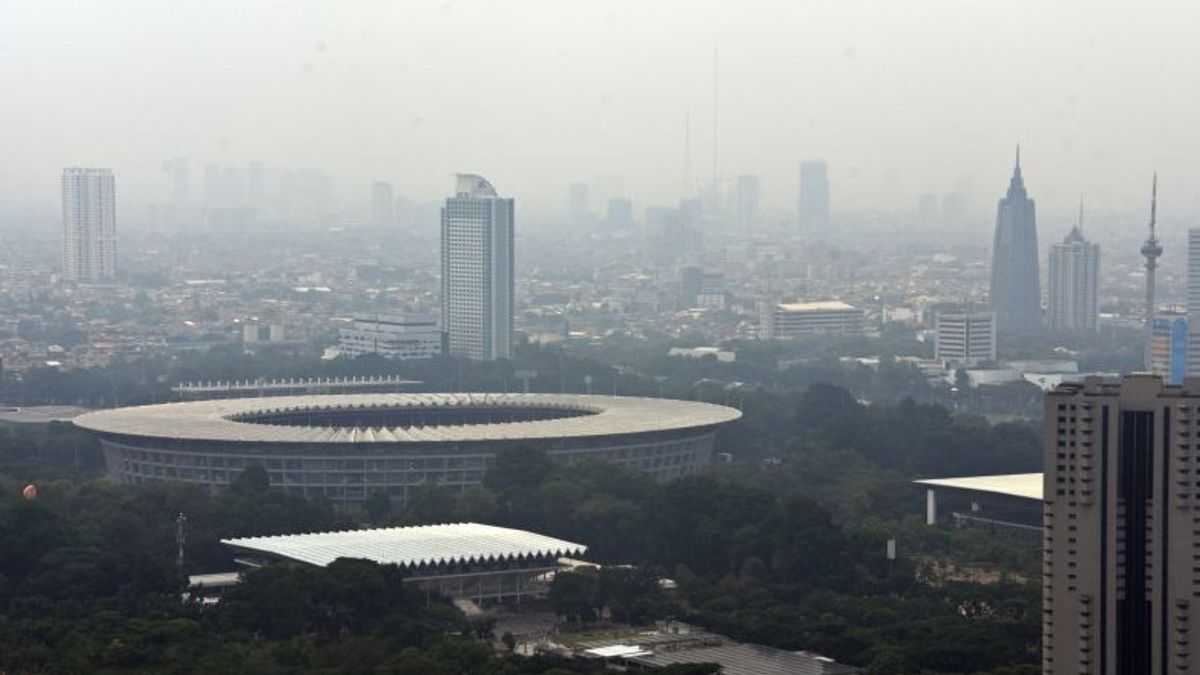JAKARTA - The Financial Services Authority (OJK) has appointed the Indonesia Stock Exchange as the institution that organizes the carbon trading mechanism. This is in accordance with Article 27 of the Regulation of the Minister of Environment and Forestry Number 21 of 2022 which was ratified on October 20.
However, Executive Director of the Center of Economic and Law Studies (CELIOS) Bhima Yudhistira assessed that the rules for playing on carbon exchanges should be made different from the stock exchange.
Article 24 of Law 4/2023 concerning Financial Sector Development and Strengthening (PPSK) does say that carbon exchanges can only be organized by organizers who have an OJK business license, but not automatically from stock exchange organizers.
"It would be strange if there was a discourse on special regulations where the securities exchange could automatically be the organizer of the carbon exchange. The OJK draft regulation should provide fair competition space to every organizer who wants to be involved," said Bhima in a statement received by VOI on April 18, 2023.
Functionally, it's different. The stock exchange has a fund search function for issuers and facilitates investors with issuers, while the carbon exchange serves as a carbon reference price discovery. There are sellers and buyers on the carbon exchange.
Khawatar jika terbatasi hanya bursa efek yang otomatis menjadi penyelenggara bursa carbon akan menghambat laju inovasi dan kedalaman pasar carbon. Karena kebingkasi dari mekanisme bursa karbon menjadi disinsentif bagi pelaku pasar yang ingin terlibat, ucap Bhima.
Ideally, it is separated from the stock exchange. Like in the United States, the organizers of the carbon exchange are not the New York Stock Exchange and Nasdaq but the Intercontinental Exchange (ICE).
Thus, the proposed stock exchange as the organizer of the carbon exchange raises various big questions about the design of the carbon exchange and the effectiveness of carbon trading in Indonesia.
OJK needs to be careful in formulating the rules for carbon exchange organizers. We certainly see that carbon exchange players in the future could emerge from technology companies that are not part of the stock exchange. This ecosystem also needs to be facilitated by the OJK," he said.
The carbon exchange is a system that regulates the recording of carbon reserves, the ownership status of carbon units, and carbon trading. This is indispensable in supporting the acceleration of Net Zero Emission's target by 2050 as sectors that have positive carbon units will receive incentives from carbon trading schemes.
"The mechanism of carbon exchanges has indeed been awaited for a long time, of course, the quality of the technical arrangements for carbon exchange organizers is important," added Bhima.
Carbon emissions or often called greenhouse gases are the biggest causes of climate change. Based on World Bank data, the total carbon emissions produced by all countries in the world as of 2018 reached 34,041,045 kilotons of CO2 equivalent. China is the country with the largest carbon emissions producing in the world with a total of 10,313,460 kilotons of CO2 equivalent.
Then, followed by the United States in second place and India in third place. Meanwhile, Indonesia is ninth with a total carbon emissions of 583,110 kilotons of CO2 equivalent.
Overcoming it, as written in the book 'Carbon Tax: Learning from Sweden and Finland' by Eykel Bryken Barus and Suparna Wijaya, the United Nations then initiated its entire members to make an agreement to reduce production of carbon emissions in Paris City, France on April 23, 2016. This agreement is known as the Paris Agreement.
Indonesia, then represented by the Minister of Environment and Forestry Siti Nurbaya, also signed the agreement. Indonesia stated that it was ready to reduce carbon emissions by 29 percent by 2030. This commitment was stated by the government through the Nationally Determined Contribution (NDC).
As regulated in Article 6Paris Agreement, countries can cooperate with each other in fulfilling their emission reduction. Although explicitly it does not mention the market mechanism in the agreement, this rule allows countries to pursue co-operative approaches and voluntarily use the International Transferred Mitigation Outcomes (ITMOs) to help meet carbon emission reduction targets.
Indonesia has the opportunity not only to reduce, but also to take economic benefits from carbon emissions. The existence of the third largest tropical rainforest in the world with an area of 125.9 million hectares, a mangrove forest with an area of 3.31 million hectares, and the world's largest peatland of 7.5 million hectares is certainly a special thing.
According to an investment law and carbon trading observer, Rio Christiawan, in his opinion in Lawonline on March 20, was at least able to absorb carbon emissions up to 113.18 gigatons.
"If the Indonesian government can sell carbon credit assuming a price of 5 US dollars on the carbon market, then Indonesia's potential revenue will reach 565.9 billion US dollars," said Rio Christiawan.
Even so, said Rio, the formation of carbon exchanges has at least three challenges. First, the mechanism for determining the reference price of carbon units to be traded.
"A precise pricing is very important, considering that the price of a carbon exchange will be a reference for non-exchange carbon trading (both the mandatory market and the voluntary market). One of the essence of the NEK Presidential Decree (Carbon Economic Value) is the determination of the reference price," said Rio.
The second challenge is to accelerate Forest Utilization Business Licensing (PBPH) in the field of restoration and allocation of carbon trading. Thus, later Indonesia's carbon trade can be dominated by the government and by the private sector of PBPH holders.
On the other hand, if the PBPH process, registration and authorization are convoluted, it is feared that the carbon exchange will be quiet in trading or dominated by foreign companies.
"If this happens, Indonesia is only a buyer or intermediary, not a carbon seller directly through the stock exchange mechanism," Rio continued.
The third challenge is to immediately complete the creation of derivative rules and technical rules regarding carbon exchanges in Indonesia, considering that carbon trading through these exchanges involves various authorizations.
For example, the Ministry of Environment and Forestry relates to the authorization of carbon trading as explained in the Minister of Environment and Forestry Regulation 21/2022.
"Then considering that the carbon exchange is mentioned in the PPSK Law, it is necessary to regulate the technical rules of the OJK and BAPEBTI (Comodity Futures Trading Supervisory Agency). Also, clear derivative regulations are needed regarding institutions that are entitled to supervision and institutions that have the right to organize carbon trading itself," he added.
The English, Chinese, Japanese, Arabic, and French versions are automatically generated by the AI. So there may still be inaccuracies in translating, please always see Indonesian as our main language. (system supported by DigitalSiber.id)









